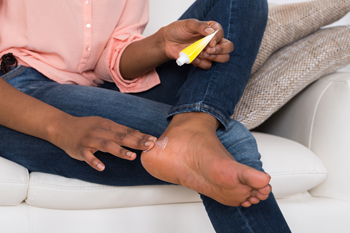

One of the many unsightly and unattractive conditions of the feet is known as cracked heels. Also known as heel fissures or split heel, this condition occurs when the skin on the heel becomes exceedingly dry. There are several signs of cracked heels that you can be on the lookout for. First, the most obvious sign of cracked heels is a developing callus on the heel that can be either a shade of yellow or brown. If the condition is relatively new, you might notice small cracks in the hardened skin callus. However, if this condition is older and has not been treated for a long period of time, then there may be deeper cracks in the callus. These deeper cracks might even bleed in severe cases, inviting infection. If you notice any of these signs, or you believe that you might have cracked heels, do not hesitate to schedule an appointment with a podiatrist today.
Cracked heels are unsightly and can cause further damage to your shoes and feet. If you have any concerns, contact Massimo Pietrantoni, DPM from Rochester Podiatry, LLP. Our doctor can provide the care you need to keep you pain-free and on your feet.
Cracked Heels
Cracked heels appear unappealing and can make it harder for you walk around in sandals. Aside from looking unpleasant, cracked heels can also tear stockings, socks, and wear out your shoes. There are several methods to help restore a cracked heel and prevent further damage.
How Do You Get Them?
Dry skin is the number one culprit in creating cracked heels. Many athletes, walkers, joggers, and even swimmers suffer from cracked heels. Age and skin oil production play a role to getting cracked heels as well.
Promote Healing
Over the counter medicines can help, especially for those that need instant relief or who suffer from chronic dry feet.
Wear Socks – Wearing socks with medicated creams helps lock in moisture.
Moisturizers – Applying both day and night will help alleviate dryness which causes cracking.
Pumice Stones – These exfoliate and remove dead skin, which allows for smoother moisturizer application and better absorption into the skin.
Change in Diet
Eating healthy with a well-balanced diet will give the skin a fresh and radiant look. Your body responds to the kinds of food you ingest. Omega-3 fatty acids and zinc supplements can also revitalize skin tissue.
Most importantly, seek professional help if unsure how to proceed in treating cracked heels. A podiatrist will help you with any questions or information needed.
If you have any questions, please feel free to contact one of our offices located in Brighton and Greece of Rochester, NY . We offer the newest diagnostic and treatment technologies for all your foot care needs.